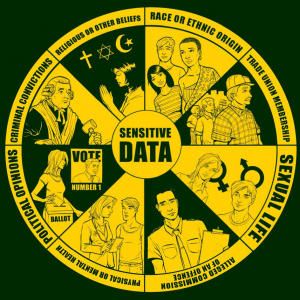Today while browsing the internet, I found this image inside a PDF on the Data Protection Commissioner’s (Ireland) website. It got me thinking about the information we share with others and how that affects our personal lives. The graphic below illustrates information, that in my opinion, everyone should keep private.
Click on picture to see full size.
In the United States and other developed nations individual privacy is rapidly deteriorating due to increased information availability on the internet. I was impressed with Ireland when I found a site that is dedicated to protecting their citizen’s information. As a whole Europe does have much better privacy laws than the United States. This is most evident in Europe’s opt out of information sharing by default laws and their banking privacy. In contrast the United States a business is allowed to opt a customer in by default and you have to explicitly opt out of information sharing (including with your bank).
For these reasons, I’m always telling people that they shouldn’t share private information and should limit the amount of information that they give out to businesses, government agencies, and other persons. Available information has gone beyond pay per search databases that require the searcher to provide a credit card and billing address that identifies them. Services like www.spokeo.com will give you the persons street, age, family members, and astrological sign for free and without registration. There are also services like www.peeepl.com, and www.mylife.com which only require a free registration for basic information.
Some of these records are obtained through public records (hence limit information you give to government), through social networks with poor privacy policies (Google), or through other more questionable means (like dumpster diving or a company selling your information).
Below are some tips on how to limit the information that is available about you on the internet and live a more private life.
- Opt out of all information sharing with every company you deal with.
- Never fill out optional information.
- If you absolutely must use social networking, adjust your privacy settings.
- Don’t do business with (or use free services from) companies with poor privacy policies.
- Don’t get arrested (court records are public information).
- Use rentals and public transportation (no vehicle registrations).
- Try to get month to month rental agreements rather than leases with credit checks.
- Avoid credit cards and electronic transactions, pay in cash as much as possible.
- Shred all envelopes, statements.
The last one is important. A small cross-cut shredder can be found at an office supply store for around $20 and is one of the best ways to prevent identity theft. According to NationalCreditReport.com, the majority of identity theft happens offline.
